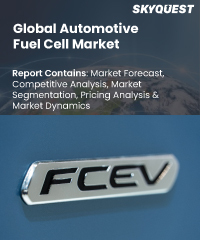
Report ID: SQMIG25C2122

Report ID:
SQMIG25C2122 |
Region:
Global |
Published Date: October, 2024
Pages:
223
|
Tables:
64 |
Figures:
75
Drivers
Favorable Government Initiatives and Investments Boost the Demand
Growing Demand for Zero-Emission Vehicles Is Set to Propel the Market Growth
Restraints
High Production and Infrastructure Costs
Limited Hydrogen Production and Storage
Our industry expert will work with you to provide you with customized data in a short amount of time.
REQUEST FREE CUSTOMIZATIONWant to customize this report? This report can be personalized according to your needs. Our analysts and industry experts will work directly with you to understand your requirements and provide you with customized data in a short amount of time. We offer $1000 worth of FREE customization at the time of purchase.

Report ID: SQMIG25C2122